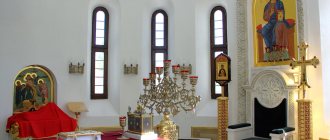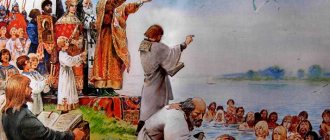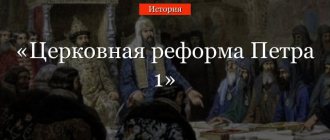The settlement of the descendants of the sons of Noah, according to R. Wilkinson. Map of 1823 Three sons of Noah. Postcard from the early 20th century.
| Check information. It is necessary to check the accuracy of the facts and reliability of the information presented in this article. There should be an explanation on the talk page. |
Sons of Noah
(in medieval sources
table of nations
) - the genus of the biblical patriarch Noah. According to Genesis chapter 10, Noah had three sons - Shem, Ham and Japheth.
There are several approaches to assessing the information contained in the Old Testament. The question remains whether the “table of peoples” covers the population of the entire ancestral homeland or only some ethnic groups that were known to the ancient Jews.
Noah's family and descendants
| Children and grandchildren of Noah ( Table of Nations ) | |
| Shem and the Semites |
|
| Boor and rude people |
|
| Japheth and the Japhetids |
|
Semites
Main articles: Sim
and
Semites
The family of Shem is described in detail in the Bible and its line can be traced back to Jesus. Semites primarily include Jews, Arabs and Assyrians. The Elamites (neighbors of the Babylonians) were descended from Elam, the Assyrians from Assur, and the Arameans (ancient Syrians) from Aram.
| Descendants of Shem | |||||||||||||||||||||||||||||||||||||
| Arfaksad | Yelam | Assur | Lud | Aram | |||||||||||||||||||||||||||||||||
| Sala | Hoole | Gepher | Mash | ||||||||||||||||||||||||||||||||||
| Ever | |||||||||||||||||||||||||||||||||||||
| Peleg | Yoktan | ||||||||||||||||||||||||||||||||||||
| Raghav | |||||||||||||||||||||||||||||||||||||
| Seruh | |||||||||||||||||||||||||||||||||||||
| Nahor | |||||||||||||||||||||||||||||||||||||
| Farrah | |||||||||||||||||||||||||||||||||||||
| Abraham | Aran | Nahor | |||||||||||||||||||||||||||||||||||
| Isaac | Ishmael | Lot | Bethuel | ||||||||||||||||||||||||||||||||||
| Jacob | Esau | Moab | Ammon | ||||||||||||||||||||||||||||||||||
Hamites
Main articles: Ham
and
Hamites
The Old Testament calls Hamites the inhabitants of North and East Africa (Egyptians, Libyans, Nubians, Cushites, Ethiopians), South Arabia, the Levant (Canaanites, Phoenicians, Philistines), Cyprus and Cilicia (Caphtorites). Sometimes representatives of the Negroid race are also called Hamites. Hamit Nimrod is credited with dominating Babylon and building the Tower of Babel. The Ethiopians and Somalis trace their kinship to Kush, the ancient Egyptians to Mizraim, and the ancient Canaanites, who were later expelled from their ancestral lands by the Jews, to Canaan. The modern descendants of Foote are most likely to be considered the Berbers and Tuaregs in Africa.
| Descendants of Ham | |||||||||||||||||||||||||||||
| Khush | Mizraim | Foot | Canaan | ||||||||||||||||||||||||||
Japhetids
Main articles: Japheth
and
Japhetids
According to the Book of Jubilees, the initial place of settlement of the Japhetids was the Armenian Highlands. After the division of languages, they spread to the east, north and west and thus populated all of Eurasia (with the exception of the Middle East, where the Semites, the descendants of Noah’s second son, Shem, settled).[2]
According to the Tale of Bygone Years (beginning of the 12th century), the Japhetids include the following peoples and tribes: Rus', Chud, Perm, Pechera, Em, Ugra, Lithuania, Zimegola, Kors, Letgola, Livs, Poles, Prussians, Varangians, Svei, Urmans, Goths, Angles, Galicians, Wallachians, Greeks, Romans, Germans, Korlyazis, Venedians, Fryags - that is, Slavs, Finno-Ugric peoples and the peoples of Western Europe.
According to the Armenian and Georgian traditions, the Armenians, Georgians and other peoples of the Caucasus descended from the sons of Japheth’s grandson, Togarmah.
| Descendants of Japheth | |||||||||||||||||||||||||||||||||||||||||||||||||||||||||||||
| Homer | Magog | Madai | Iavan | Tubal | Meshech | Firas | |||||||||||||||||||||||||||||||||||||||||||||||||||||||
| Askenaz | Rifat | Fogarmah | Elisa | Tarshish | Kittim | Dodanim | |||||||||||||||||||||||||||||||||||||||||||||||||||||||
| according to Leontiy Mroveli | |||||||||||||||||||||||||||||||||||||||||||||||||||||||||||||
| Ike | Kartlos | Bardos | Movakan | Lekos | Eros | Caucasus | Egros | ||||||||||||||||||||||||||||||||||||||||||||||||||||||
Reviews of the book “Children of Noah” by Eric-Emmanuel Schmitt
War. This terrible word can make even the most courageous and formidable warriors tremble. War can break into any, even the quietest corner of the planet and bring only grief and fear. It has already claimed the lives of millions and will continue to do so until people come to their senses and stop these useless warriors. This book is small in volume, but it says a lot. It tells us about the life of a little boy, but at the same time about millions of unfortunate people like him. What is the idea of the book? For me it is faith. Time passes, people change, and along with people, thoughts, beliefs, and feelings change. Is it important to believe in God? What is God? Why is it different for everyone? Why has humanity suffered so much? The author answers these questions through the mouth of the good Father Pons. “People themselves cause harm to each other, and God has absolutely nothing to do with it.” He created people free. This means that we rejoice or suffer regardless of our merits or demerits. What a terrible role you want to assign to God! Can you really admit for a moment that God loves those who managed to escape from the Nazis, and hates those who failed? No, God does not interfere in our affairs! “Are you saying that no matter how it turns out, God doesn’t care about it?” “I want to say that, no matter how it turns out here, God has completed his work.” And now it's our turn. We must take care of ourselves. Isn't that so? After all, to say that we have problems because God has forgotten about us and therefore does not exist is just an excuse. It has long been said that man is the crown of creation. But is it? After all, we are not perfect, we are far from perfect. Yes, we have succeeded in many ways: we have invented cars, the Internet, a bunch of fashionable gadgets, but have we solved more global problems? Why are people still dying of hunger? Why do warriors continue to endure pain and suffering? Why do murders happen? Yes, all because the person himself does not want to open his eyes and look at all the deeds that he has done. We will not protect ourselves with an expensive phone, beautiful shoes or the fastest car. No matter how much money we have in our pocket, death is inevitable. And God? I am horrified by what I keep hearing from people: “I don’t believe in God. He's gone." Isn't this a step towards failure? Isn't this the cause of all troubles? Sometimes it is so difficult to accept the fact that you yourself are to blame for all your misfortunes. Sometimes we forget about the main thing - our soul. The book is easy to read, the language is easy and understandable, but despite all this it leaves a deep imprint on the reader’s mind. I think everyone should read this. Perhaps, after reading this book, someone will stop and reconsider all their views, someone will be saved and will not fall into the abyss.
Disrespectful son of Noah 3 letters
[Home] X
A
M
- X is the first letter
- A is the second letter
- M - third letter
Leader of "Civil Defense" 5 letters
Evil spirit from the reeds in Slavic myths 5 letters
boor
I m outdated A contemptuous name for a person who belonged to the lower classes and therefore lacked human dignity (in the speech of nobles). II m. 1. up-down. A rude, arrogant, ill-mannered person. 2) Used as a reprimanding or abusive word.
boor
see also boorish, boorish 1) colloquial. Unscrupulous, arrogant man. 2) In Russia before 1917: a contemptuous name for a peasant or commoner.
irreverent
1) Treating others without courtesy, without respect; rude. 2) Expressing disrespect.
irreverent
-aya, -oe; -flax, -flax, -flax. see also disrespectful, irreverence a) Not showing respect or respect to someone; disrespectful. N's children. Disrespectful to elders. b) ott. Expressing discourtesy, disrespect, full of discourtesy, disrespect for someone. Speak in a disrespectful tone.
son
1) A male person in relation to his parents. Ott. trans. decomposition A person closely associated with someone or something; pet. 2) Descendant. 3. transfer A man as a bearer of the characteristic features of his environment, his people. Ott. A person, a citizen as a participant in something, as a native of a country, a representative of a nationality. 4) A male person in relation to his confessor or a person of clergy (usually in conversion). 5. decompression A young male animal.
son
-a, name; (obsolete), son; pl. - sons, -vei and, (high), sons, -ov; m. see also. son, sonny, little son, sonny, sons 1) a) A male person in relation to his parents. Eldest, youngest son. Grown-up son. The only son. Raise and marry a son. Believe in your son. You have a very good son. Adopted, betrothed, named son. (in relation to the persons who adopted him) A bastard son. (born out of wedlock in relation to the father) Suitable for smb. as sons (suitable in age, to be at that age) Son of man (one of the epithets of Jesus Christ) b) extended. About animals. This horse is the son of a winner of many competitions in past years. 2) only plural. The younger generation, immediate descendants. What are we leaving to the next generation, our sons? * The spirit of the fathers has risen in the sons (Zhukovsky) 3) usually in address A male person in relation to a person of clergy rank. Spiritual son. (in relation to his permanent confessor) 4) what is a Man as a bearer of the characteristic features of his people, his time, his environment, etc. Brave (courageous) sons of their Fatherland. Son of his time. Sons of the East. Sons of the steppes. * For a sincere union, connecting Mozart and Salieri, Two sons of harmony (Pushkin) - prodigal son - son of a bitch
whine
I nesov. nepereh. decomposition 1) Make viscous, plaintive sounds. 2. transfer Annoyingly complaining about something; cry. II Nesov. nepereh. decomposition Make itself felt with a feeling of dull, viscous pain.
whine
-whining, -whining; aching; nsv. see also whining 1) a) only 3 l. To hurt (about a feeling of dull, pulling, viscous pain) Legs ache. In damp weather my shoulder ache. The tooth is aching. An old wound began to ache. Soul, heart aches (about feelings of melancholy, anxiety) b) lex., no. Aches in the bones. There was a pain in my lower back. 2) decomposition It's annoying to complain about something. He came and started whining. The girl whined tearfully. No, I won’t buy it. He is always dissatisfied, always whining. 3) Make drawn-out, dull sounds. The wind whines in the chimney. The violins whined annoyingly. The circular saw whined.
Possible children
Among the possible children, they name Elizaveta Grigorievna Temkina, who was born on July 13, 1775 in Moscow in the house of Catherine’s favorite Grigory Potemkin. The main argument that Temkina is the daughter of the empress is that Catherine at that time did not appear to the courtiers for several days, citing illness.
Rice. 4. Portrait of Elizaveta Grigorievna Temkina
However, at the time of Elizabeth’s birth, Catherine was already 45 years old, and it is unlikely that she would have endured the carriage journey to Moscow at the last stage of pregnancy. Most likely, the girl was born from one of the count’s mistresses, of whom he had many.
There is no doubt that Temkina is Potemkin’s daughter. At that time, it was customary among the nobility to give truncated surnames to illegitimate children, thereby, as it were, recognizing them. Potemkin took a great part in the girl’s fate. She owned vast estates.
In 1794, the girl married Ivan Khristoforovich Kalageorgi, who later took the post of vice-governor in Kherson. The couple had 4 sons and 6 daughters. The marriage was long and happy.
The portrait of Temkina by Borovikovsky has been kept in the Tretyakov Gallery since 1925.
Illegitimate children
Only one illegitimate child of the empress is known for certain. This is Alexey Bobrinsky.
Alexey Grigorievich Bobrinsky
The newborn was born on April 11-12, 1792 in St. Petersburg at the Summer Palace. Historians have no doubts about him - he was Catherine’s illegitimate son from her favorite Grigory Orlov. The origin of the baby was practically not hidden. The boy was handed over to be raised by the Empress’s personal wardrobe master Vasily Shkurin. However, both parents visited their son more than once. Secretly, but everyone at court knew perfectly well about these visits.
Rice. 3. Portrait of Alexey Bobrinsky as a child
At the age of 13, the boy was sent to the Land Cadet Corps. He graduated with the rank of army lieutenant. For his diligence, the young man was awarded a gold medal and sent on a foreign tour along with other best students. Whether the cadet really studied so brilliantly or whether the origin and special attitude of the corps leadership towards the student affected the student, one can only speculate. But until the age of 13, all his knowledge was limited to German and French and a basic knowledge of geography and arithmetic.
Bobrinsky became famous only for the fact that during his stay in Paris he incurred debts of almost 1 million rubles and squandered all the money on entertainment, games and women.
Catherine was dissatisfied with her son and kept him in Livonia far from the court, but it cannot be said that fate was unkind to him. He was given decent money to live on, his mother bought an estate, and he was not forced to serve.
Paul I, having come to power, showered his half-brother with favors: he granted the title of count and the rank of major general, donated a house in St. Petersburg and a large estate in the Gdov district of the Pskov province.
In 1798, the count retired and spent the rest of his life on his estate in the Tula region, where he studied astronomy, mineralogy and agriculture. Lived until 1813. He had numerous offspring.









